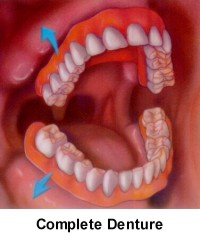Denture:
A denture is a removable replacement for missing teeth and the tissues connected to those teeth. It is made of acrylic plastic and sometimes porcelain and metal materials. A denture closely resembles natural gum tissue and teeth.
Complete dentures:
Complete dentures replace all of the teeth, while partial dentures fill in the spaces created by missing teeth and prevent other teeth from shifting position. Complete dentures are “immediate” or “conventional.” An immediate denture is a complete denture or partial denture that is inserted on the same day, immediately following the removal of the natural teeth. The immediate denture acts as a Band-Aid to protect the tissues and reduce bleeding after tooth extraction. The conventional denture is ready for placement in the mouth about 8 to 12 weeks after the teeth have been removed and the gum tissue has healed. However, we recommend more time before placing a conventional denture.

When should I clean my dentures?
Clean your dentures where possible after every meal or at least twice a day. At the very least remove them and rinse off any food and debris with warm or cold water.
How should I clean my dentures?
To clean your denture, take a small or medium sized toothbrush which can access all parts of the denture and gently scrub this across. All parts of the denture should be cleaned- rests, clasps, the base all of them
You can just use water or I often recommend a bit of soap, but whatever is used it shouldn’t have too much abrasive as this can damage the acrylic resin. Some denture pastes and certainly some toothpastes contain such abrasives.
These are the brushes you may require in your armoury:
You should never clean your denture with it still in your mouth. It may sound obvious but lots of people do. You will miss the most important place on the denture, the underside- which could end up causing denture stomatitis.
More importantly it will prevent you from doing a proper job of cleaning your natural teeth and you will inevitably miss large areas of plaque sheltered by the denture which can lead rapidly to gum disease and dental decay.
When cleaning your denture, half fill the sink with water and do it over this- I can’t tell you how many repairs and broken dentures we see from people dropping them in the sink during cleaning and the water will prevent this from happening. Grip them firmly but don’t squeeze too hard, so as not to bend or risk breaking them.
You need to clean your natural teeth really well- this means brushing, flossing and using interdental brushes. Particular attention needs to be given to the areas which contact the denture and in between the missing teeth . The surfaces of the teeth that face the space and would normally be cleaned with floss or interdental brushes are the most often missed and vulnerable to plaque collecting.
Best Dentist Near and find good nala Dentist in Your area laser dentistry,cosmetic dentistry,preventive dentistry and pediatric dentistry complete denture
